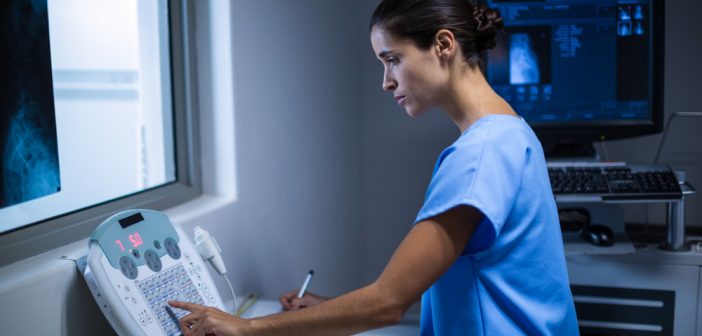Are you interested and fascinated by the use of radiation in the diagnosis and treatment of patients? Being a radiologic technologist may be a fit for you.
Radiologic technologists are ranked among the top health care support jobs in the United States of America. Also the U.S bureau of labour statistics projects that the number of radiologic technologists will increase in the future.
Who is a radiologic technologist?
A radiologic technologist is a trained medical professional skilled in the use of radiations to generate radiological images used in the diagnosis, monitoring and treatment of patients.
They operate specific radiological equipment such as: X-rays, computer tomography scans and magnetic resonance imaging machines. They collaborate with doctors in the clinical management of patients.
Radiologic technologist role
Radiologic technologists work in a hospital where they are involved in preparing patients for radiological tests, operating radiological machines and presenting physicians with radiological images required for clinical management.
In addition, radiologic technologists work in clinics, laboratories and diagnostic radiological centers.
They work daily, usually full time and provide their services to patients across different age groups.
Radiologic technologists carry out radiological image studies on a specific region of the body and follow the physician’s instructions during the process of preparing clients.
For instance, if a client has a suspected fracture of the right leg, a radiologic technologist will carry out an X-ray of the right leg only. They administer radiation at doses that are safe for humans and due to repeated exposure to radiation, they are required to use protective clothing at work.
They have the capacity to operate ultrasound sonography machines and mammograms on females being investigated for breast cancer or benign breast lesions.
There are sub-specialization opportunities for radiologic technicians; radiologic specialists may opt to undergo further training in radiological specialties such as vascular interventional radiography for certain cardiovascular conditions and radiotherapy for cancer cases.
How to become a radiologic technologist
To practice as a radiologic technologist, you need to acquire specific knowledge and practical skills to operate technical radiological machines. Fundamental knowledge in science courses such as biology, chemistry and physics will prepare you to excel in a radiography educational program.
Radiologic technologists are trained in an accredited program for an associate degree or in a college for a bachelor’s degree. The duration of training varies but ranges between 2- 4 years. Afterward, graduate students are expected to pass radiology certification and licensing exams before they start practicing.
Skills needed include research, computer literacy and organisational capabilities to succeed in a health facility. There are national and state-level exam criteria you are expected to attain before being a registered radiologic technologist.
If you intend to sub-specialise in a specific radiology specialty, you have to sit and pass particular exams.
Also, because of the rapid developments in radiology and technology, radiology technologists are expected to register in a continuing medical education program to stay updated with the current radio-imaging trends and to upgrade their skills.
Career path
The career path for radiologic technologists is diverse and depends on the individual’s level of ambition, passion and career goals.
They may opt for an academic path where the person works as an educational instructor in a radiography program. Also, individuals who fancy certain radiology specialties can choose a specific area such as radio-oncology.
Radiological specialists have undergone additional training in a narrow radiological area. The demand for these specialists is rising due to the need for radiologic imaging studies and radiotherapy of target organs
Radiologic technologist salary
You’d expect good monetary compensation for radiology technologists since a lot of training and skills acquisition go into the process of becoming one.
The annual salary varies from country to country and even at state levels. In the United States of America, the average annual salary of a radiologic technologist is $64,000. Although, factors such as type of health facility( hospital vs diagnostic laboratory), state and experience level can influence the income of a radiologic technologist.
Freelance radiology experts
Freelance radiology specialists can help with research, data analysis and writing. Radiology experts can be hired on demand for analysis of specific data such as EEG graphs or neurological activity. They can also be accessed for freelance projects that involve writing laboratory protocols, literature search reports, or blog articles. Freelance radiology researchers can help with developing educational material. Need to hire a freelance radiology expert? Work with on-demand specialists on Kolabtree.







